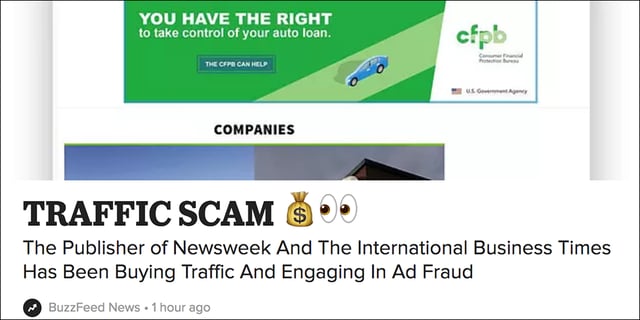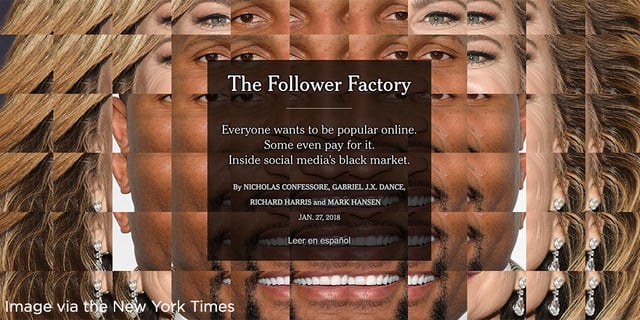
This week's review of ad fraud and quality in the digital advertising space.

BuzzFeed News this week reported that "several of Newsweek Media Group’s business websites are buying and manipulating traffic that originates on pirated video streaming sites. The company acknowledged buying traffic, but denies engaging in ad fraud." Read more on our blog.
Adweek added to the story, citing a Pixalate representative as saying: “This news also highlights the fact that it is vital for advertisers to evaluate every website based on how they generate traffic, where the traffic comes from, and other key indicators of success — even if it is a known website."
 "Seven months after the Interactive Advertising Bureau’s Tech Lab released final specs for ads.txt, the new standard for sanctifying the reselling of publishers’ inventory has reached critical mass," reported MediaPost, citing recent OpenX research and Pixalate data.
"Seven months after the Interactive Advertising Bureau’s Tech Lab released final specs for ads.txt, the new standard for sanctifying the reselling of publishers’ inventory has reached critical mass," reported MediaPost, citing recent OpenX research and Pixalate data.
 "Ad dollars are flowing to mobile and fraudsters have noticed," wrote AdExchanger. "The mobile performance industry is highly vulnerable to fraud and the only way to effect change is for everyone to get wise," the article noted.
"Ad dollars are flowing to mobile and fraudsters have noticed," wrote AdExchanger. "The mobile performance industry is highly vulnerable to fraud and the only way to effect change is for everyone to get wise," the article noted.

According to TechCrunch, Google "removed 700,000 potentially harmful or deceiving apps from its store last year. That’s up 70 percent from 2016." The article added: "...[T]here are some clear patterns in how malicious and deceiving developers try to sneak their apps into the store. They often try to make their apps look like existing popular apps, for example, to trick users into installing them."
 According to the New York Times, social media platform have a major fake account problem. "Celebrities, athletes, pundits and politicians have millions of fake follower," wrote the NYT. "In November, Facebook disclosed to investors that it had at least twice as many fake users as it previously estimated, indicating that up to 60 million automated accounts may roam the world’s largest social media platform," the article noted. "These fake accounts, known as bots, can help sway advertising audiences and reshape political debates. They can defraud businesses and ruin reputations. Yet their creation and sale fall into a legal gray zone."
According to the New York Times, social media platform have a major fake account problem. "Celebrities, athletes, pundits and politicians have millions of fake follower," wrote the NYT. "In November, Facebook disclosed to investors that it had at least twice as many fake users as it previously estimated, indicating that up to 60 million automated accounts may roam the world’s largest social media platform," the article noted. "These fake accounts, known as bots, can help sway advertising audiences and reshape political debates. They can defraud businesses and ruin reputations. Yet their creation and sale fall into a legal gray zone."
Sign up for our blog to stay updated with new stats, trends, and analysis on digital ad fraud.
*By entering your email address and clicking Subscribe, you are agreeing to our Terms of Use and Privacy Policy.
These Stories on Weekly Recaps
*By entering your email address and clicking Subscribe, you are agreeing to our Terms of Use and Privacy Policy.
Disclaimer: The content of this page reflects Pixalate’s opinions with respect to the factors that Pixalate believes can be useful to the digital media industry. Any proprietary data shared is grounded in Pixalate’s proprietary technology and analytics, which Pixalate is continuously evaluating and updating. Any references to outside sources should not be construed as endorsements. Pixalate’s opinions are just that - opinion, not facts or guarantees.
Per the MRC, “'Fraud' is not intended to represent fraud as defined in various laws, statutes and ordinances or as conventionally used in U.S. Court or other legal proceedings, but rather a custom definition strictly for advertising measurement purposes. Also per the MRC, “‘Invalid Traffic’ is defined generally as traffic that does not meet certain ad serving quality or completeness criteria, or otherwise does not represent legitimate ad traffic that should be included in measurement counts. Among the reasons why ad traffic may be deemed invalid is it is a result of non-human traffic (spiders, bots, etc.), or activity designed to produce fraudulent traffic.”

